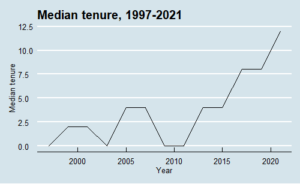 Something is rotten in the City of Lakewood, and one aspect of the rot may be the lengthening tenure of members of the City Council.
Something is rotten in the City of Lakewood, and one aspect of the rot may be the lengthening tenure of members of the City Council.
Lakewood became a city in 1996, and it therefore has a City Council, with seven members. These seven members have four-year terms, and every two years there are elections for three or four members. I don’t know how the City Council was formed on Lakewood’s initial incorporation, but in 1997 there were elections for all seven council members.
In 1999, three of the council members successfully stood for re-election, and in 2001 it was the turn of the other four. This gave rise to the massacre of November 6, 2001, when two of the council members standing for election lost their seats. You might think this isn’t a big deal, but in the 25-year history of Lakewood, it was the only time when sitting members of the Council have been defeated. In Lakewood, incumbents have a huge advantage, and the longer their stay in office, the longer they stay in office.
We might then ask why council members would want to stay in their positions. Maybe they enjoy the public service, or perhaps they see it as a stepping stone to county, state, or federal office. Or maybe it is a nice piece of extra income. In the modern day it is common to get income from various sources, and according to the City of Lakewood, council members get paid $16,800 a year—and a bit more if they are mayor or deputy mayor. But whatever the reason, there is a trend for Lakewood council members to hang on for longer.
I have shown this in the following graph:

On the x-axis are the years, from 1997 through to 2021, and on the y-axis the median number of years that the council members elected in any year have been in elected office. To illustrate this, in 2019 two council members stood for re-election: Don Anderson and Paul Bocchi. Marie Barth decided not to seek re-election.
At that time Don Anderson had been a council member for twelve years, Paul Bocchi for eight years. Linda Farmer replaced Marie Barth. The median number is therefore eight years. By the way, I am counting years to the last election, not years to any between-election appointment to the Council.
What we see from the graph is that since 2009 council members’ median elected tenure has been steadily rising. In 2017 and 2019 it was eight years, after the November 2021 election the graph moved to twelve years. Put another way, five of the seven council members in place in 2012 are still in office.
This is not good for democracy. For the best part of a decade, almost the same group of council members have been sitting with each other. They are used to each other’s presence, and it is going to be increasingly difficult to rock the boat. The council is part of the machine, and agendas and relationships can emerge that have a lasting impact on the City.
Lakewood citizens might feel that there is nothing they can do about the situation, given that it has been over 20 years since an incumbent council member has been voted out of office, but this depressive posture might be part of the problem. By voting against sitting council members, whoever they are, it might be possible to slow down the rot. Unfortunately Lakewood must wait until 2023 to get another opportunity.